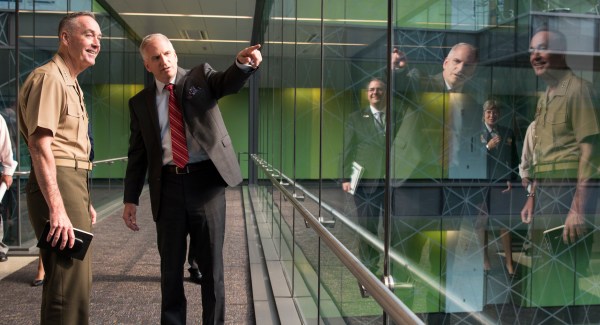 A view of ASU’s Decision Theater, which will enable big data visualizations during NGA-backed research under the Foresight Initiative. (Credit: ASU)
A view of ASU’s Decision Theater, which will enable big data visualizations during NGA-backed research under the Foresight Initiative. (Credit: ASU)The National Geospatial-Intelligence Agency this week awarded a $20 million contract to Arizona State University to study the risks climate change poses to national security.
The so-called Foresight Initiative, announced June 18, will leverage the university’s advanced computing and modeling capabilities to study the impact climate change could have on critical natural resources, such as water, food and energy. The initiative also will play a key role in helping to accelerate NGA’s efforts to promote activity-based intelligence (ABI) — an emerging intelligence discipline focused on leveraging big data to discern threat patterns and unknown relationships, networks and behavior patterns. The ASU research effort would apply ABI to discern the climate change risks to the water supply.
The Foresight Initiative “will apply ubiquitous cloud computing and storage technologies, advances in natural user interfaces and machine learning to address unique geospatial data handling and visual analytic challenges driven by the volume and character of future persistent data flows,” according to a statement by ASU’s Office of Knowledge Enterprise Development. “The resulting capabilities will allow analysts and decision-makers to dynamically interact with diverse data sets in a real-time modeling and simulation environment.”
ASU’s Decision Theater, equipped with advanced modeling and simulation systems connected to panoramic high-definition displays, will be used during the research effort to enable visualization of large amounts of data, policy parameters and environmental uncertainties. “Scientists, analysts and decision-makers can easily interact in real-time to tweak the rules and datasets to account for new insights and deeper understanding of relationships, providing a range of outcomes based on the changes. This allows for more effective decision-making among people from different backgrounds,” ASU said in a statement.
“Our partnership with Arizona State University is a prime example of the intelligence community working with academia to address strategic global issues and create capabilities that benefit everyone,” NGA Director Letitia A. Long said. Long has been a major proponent of leveraging multidisciplinary big data analytics to study difficult intelligence problems. In a recent article published in the Intelligencer: Journal of U.S. Intelligence Studies, Long called ABI “the most important intelligence methodology of the first quarter of the 21st century” and said it is only now becoming a viable option for analysis because of major advances in cloud computing, advanced tracking algorithms, high-speed computing and inexpensive data storage.
“This is a tremendous partnership and opportunity for a real, tangible impact in addressing strategic security and humanitarian needs,” said Nadya Bliss, principal investigator of the Foresight Initiative and assistant vice president, research strategy with ASU’s Office of Knowledge Enterprise Development. “It is also pioneering how the academic and government research communities can leverage each other’s strengths to seek solutions to these global-scale issues.”





